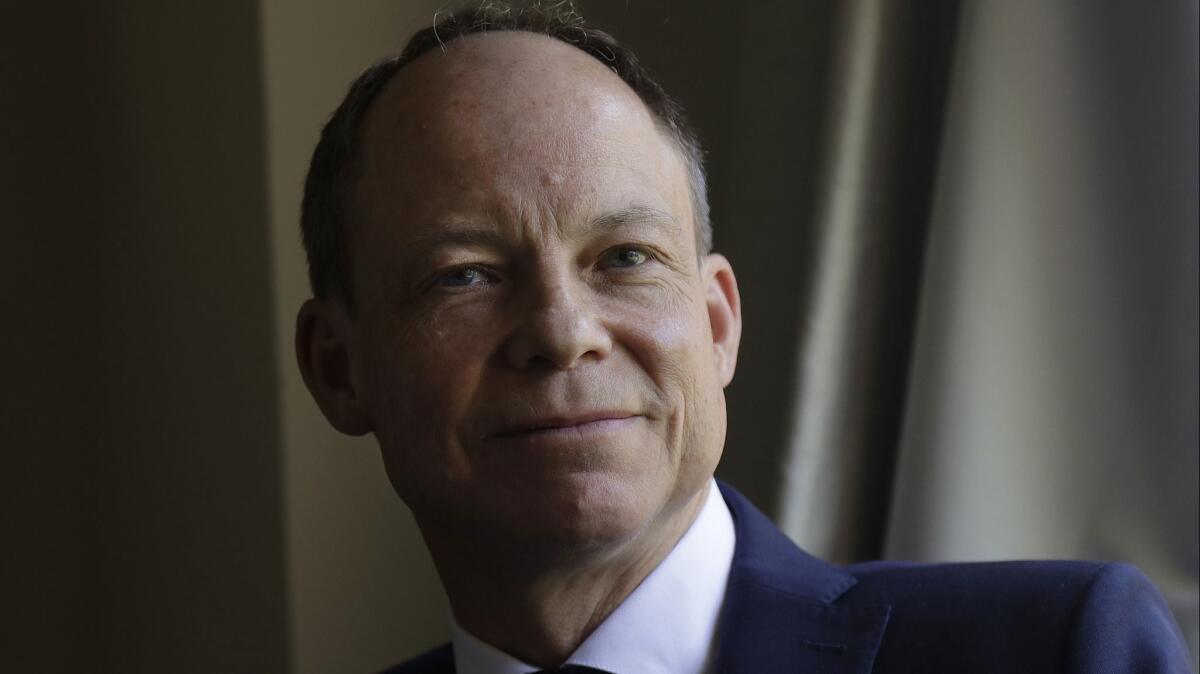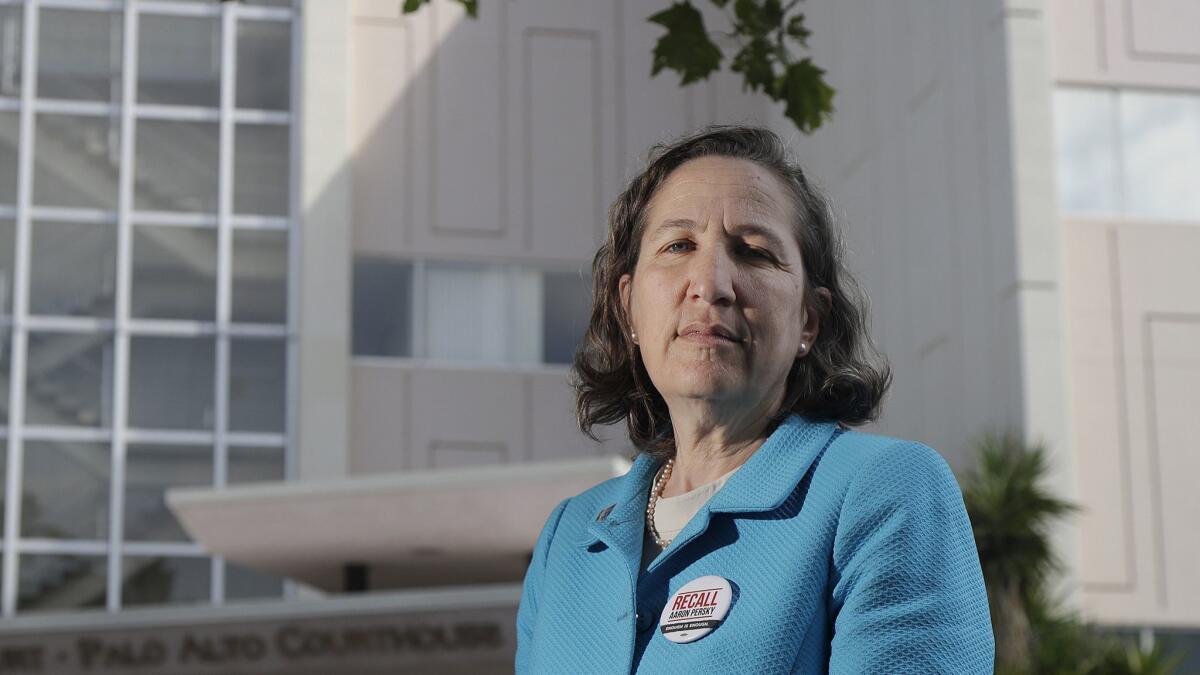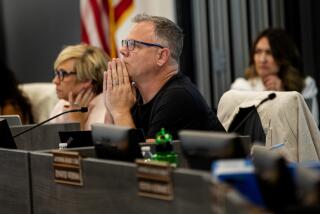Vandalism, threats, broken friendships: The heated campaign to recall judge in Brock Turner case

Reporting from San Francisco â A campaign to recall a judge for a lenient sentence in a high-profile sexual assault case has fractured long-term friendships, divided the liberal Democratic community of Santa Clara County and pitted feminists against feminists.
Voters will decide Tuesday whether to recall Judge Aaron Persky, who two years ago sentenced Stanford University swimmer Brock Turner to six months in jail for assaulting a woman who lost consciousness after heavy drinking.
Turner, who was 19 at the time, was convicted of three felonies: two for digitally penetrating an unconscious or intoxicated person and one for assault with intent to commit rape. He served three months and must register as a sex offender for life.
The sentence sparked a national uproar, coming at a time of heightened awareness of campus sexual assaults and on the eve of the #MeToo movement. Persky, 56, appointed by former Gov. Gray Davis, is the first judge in California to face a recall vote in more than 80 years.
Emotions are so high that vandals have spray-painted over lawn signs opposed to the recall. The pro-recall signs display a photo of Persky next to Turnerâs mug shot, and both the judge and the woman leading the campaign to oust him have received threats.
âThere are many people, who have been allies on a lot of issues, who are on opposite sides of this particular one,â said Santa Clara County Dist. Atty. Jeff Rosen, who opposes the recall.

Among them are Perskyâs wife and Dr. Sophia Yen, one of the recall leaders, who had been friends for more than 10 years, attended parties at each otherâs homes and whose children played together. They no longer talk.
Stanford law professor Michele Landis Dauber, who is a family friend of the victim in the Turner case, is the public face of the recall. She is a sociologist, not a lawyer, though she graduated from law school. She has long been an advocate for victims of sexual assault.
Leaders on the other side include two female Santa Clara University law professors, the first black female judge in Northern Californiaâs state courts and a former federal public defender.
The legal community has largely opposed the recall, calling it a threat to judicial independence.
More than 90 California law professors, including 20 from Stanfordâs law school, have signed a statement opposing it. They say it will encourage judges to give tougher sentences and perpetuate mass incarceration.
Stanford law professor Deborah Rhode, who specializes in legal ethics, has remained neutral.
Turnerâs sentence was âegregiously inadequate,â she said, but recalling the judge was the wrong response.
âYou donât want to set a precedent punishing judges for leniency because the system creates every incentive for them to operate on the reverse principle and throw away the key,â Rhode said.
Dauber insisted that the recall would not make other judges more punitive.
âI have greater faith in judicial integrity than apparently the dim view that Judge Perskyâs supporters have,â she said.
U.S. Rep. Zoe Lofgren, a liberal Democrat from San Jose, and the bar associations of Santa Clara and San Mateo counties oppose the recall.
In favor are the National Organization for Women and other womenâs groups, U.S. Sen. Kirsten Gillibrand (D-N.Y.) and several members of Congress and the state Legislature.
Recall proponents accuse Persky of being easy on criminals who come from privileged backgrounds in sexual assault and domestic violence cases.
Instead of seeing Turner as âa calculated, lying, unrepentant sex predator,â Dauber said, Persky, ârefracted through the lens of privilege, sees a good kid who made a mistake.â
Dauber has singled out a handful of cases Persky handled that she said reflected bias in favor of people of privilege.
The anti-recall campaign disputed her version of the cases, noting that one of the defendants was a plumber and that another judge, not Persky, sentenced one of the other defendants.
âTo the extent you can find a pattern, for young offenders with no prior record, he did often give them a sentence which gave them a chance ⌠and tried to keep them in school or in a job,â said Santa Clara University law professor Ellen Kreitzberg, one of the anti-recall leaders. âHe did it regardless of race or ethnicity.â
Californiaâs Commission on Judicial Performance, a watchdog agency, received thousands of complaints about Persky after Turnerâs sentencing and issued a statement saying it found no bias.
Persky stopped hearing criminal cases after the Turner uproar and now works from home as a night judge, issuing warrants and protective orders in domestic violence cases.
Four years are left in his six-year term.
Persky said in an interview that he never seriously considered resigning, though he has had to beef up security at his home and be escorted into the courthouse by a sheriffâs deputy through an entrance used for jail inmates.
He said he believes voters will reject the recall if they look at it dispassionately because most people want judges âwho can follow the rule of law and ignore public opinion,â as required by Californiaâs code of judicial ethics.
âI think it is critical to prevail because if the recall wins, it is sort of a blueprint for judicial recalls in the future,â Persky said.
Some judges already are questioning their decisions and issuing stricter sentences, Rosen and others said. Rosenâs office sought a six-year prison term for Turner, and Rosen publicly condemned the six-month sentence.
After Turnerâs sentencing, Rosen went to Sacramento and won passage of a law that makes the crimes Turner committed punishable by a mandatory three years in prison â the same sentence required when sexual assault is by force.
Rosen said Persky was not considered a particularly lenient judge, and âmost judges in California would have done the same thingâ two years ago. Turner had no criminal record, and the seriousness of campus sexual assaults was not as appreciated back then, Rosen said.
Turner, who also was intoxicated during the assault, was sentenced to three yearsâ probation, withdrew from Stanford and returned home to Ohio, where neighbors will be notified of his sex offender status whenever he moves. He cannot live near schools or child care centers.
The case gained notoriety when Rosenâs office released a lengthy written statement by the victim after the sentencing. It reflected her immense pain and went viral. She was 22 when assaulted and did not attend Stanford.
Former Vice President Joe Biden commended her courage and expressed âfurious anger.â Actress Sharon Stone read the statement aloud at a symposium Rosen organized to address campus sexual assault.
âTwo years later, after what has happened, now everybody says, âI would have sent Turner to prison,ââ Rosen said.
âSo much has changed in the last two years,â he said. âThis case was in some ways an early precursor to the #MeToo movement.â
Yen, who teaches pediatric medicine at Stanford, said Perskyâs sentence had a âchilling effect on women everywhereâ and discouraged victims from reporting sexual assaults.
Yen called it âsadâ that her long friendship with Perskyâs wife, whom she described as a feminist, has suffered as a result of the Turner case.
Yen emailed her friend two years ago to ask if her husband would resign and spare his family the âpublic attention/humiliationâ of a recall and the prospect of recall billboards with his photograph.
Perskyâs wife, who the anti-recall campaign asked not to be identified because of concern for her safety, demurred.
The recall campaign has raised about $1.2 million. Records show anti-recall committees reported contributions of $1.1 million, $400,000 of that in non-monetary legal services.
Two candidates will appear on the ballot Tuesday to succeed Persky should the recall succeed: Assistant Santa Clara Dist. Atty. Cindy Hendrickson, who supports the recall, and civil lawyer Angela Storey, who opposes it.
Dauber has accused Perskyâs supporters of victim blaming, and people âget so angryâ at campaign events, Santa Clara Universityâs Kreitzberg said. To quell that anger, she and other recall opponents stress they are not defending a sexual assault.
âThis is not a referendum on rape or rape culture,â Kreitzberg said. âWe are against rape and sexual assault, and we share common abhorrence of violence against women and children.â
Twitter: @mauradolan
More to Read
Sign up for Essential California
The most important California stories and recommendations in your inbox every morning.
You may occasionally receive promotional content from the Los Angeles Times.










